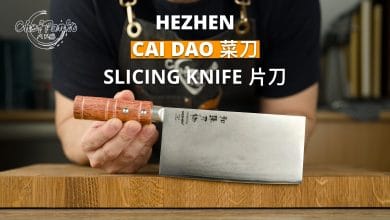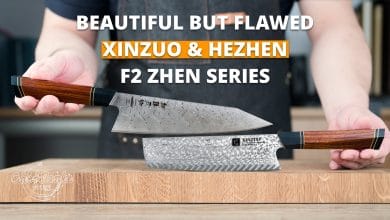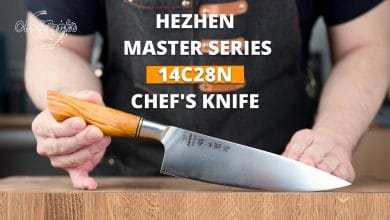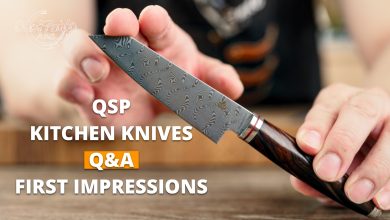There are several rolling knife sharpeners on the market, and Worksharp has now introduced its own Worksharp Rolling Knife Sharpener. Known for their innovative sharpening systems, I wanted to see what Worksharp offered in this category.
The Worksharp Rolling Knife Sharpener
The Worksharp Rolling Knife Sharpener is designed for easy knife maintenance, even if you don’t have advanced sharpening skills.
Best for Regular Upkeep
This sharpener is ideal for maintaining knives that are in good to decent condition. It effectively keeps blades sharp but is not suitable for fixing severely dull or damaged knives. Its performance can also vary depending on the quality of your knife’s steel.

Not for Major Repairs
For major repairs or significant reshaping, you will need other methods. This sharpener is perfect for regular touch-ups but won’t restore a knife with severe damage, such as a large chip or a blade that’s become too thick from improper sharpening.

What’s in the Box
Now that we’ve covered the basics, let’s see what’s in the box. You’ll find the Rolling Knife Sharpener, along with a Diamond Coarse 320 and Medium 600 Magnetic Abrasive Disks, plus a Fine Ceramic Abrasive to hone your knife. It also includes a Magnetic Angle Block with four different angles: 15, 17, 20, and 25 degrees. The 20 and 25-degree come with a raised blade holder, which is great for smaller knives like pocket knives or other small fixed blades.

If you’re new to using the rolling knife sharpener, here’s a simple guide to get you started:
Magnetic Angle Block & What Angle To Use
The best angle for sharpening depends on how you use your knives. For most kitchen knives, start with a 15-degree angle for a sharp edge. If you often use your knives more aggressively, consider a higher angle of 17, 20, or 25 degrees for better durability. If you are unsure, begin with 15 degrees and check the edge during your next maintenance. If you notice microchips, it may indicate that the 15-degree angle isn’t suitable for your purpose. In that case, switch to a higher angle for a sturdier edge.

Choosing the Right Abrasives
With three abrasives included, you might wonder which to use. For first-time sharpening, start with the Coarse 320 grit abrasive to set the initial edge. Progress to the Medium 600 grit for refining, and finish with the Fine Ceramic abrasive to polish the edge.

If this is not your first time using the Rolling sharpener, look at your knife’s edge. If it’s very dull, begin with the Coarse 320 grit. If the edge is still in decent condition, skip the coarse 320 and use the Medium 600 grit to remove less material and extend the knife’s lifespan.
Attaching the Blade to the Magnetic Angle Block
For knives 20cm (8 inches) or shorter, attach the magnetic block in the center of the blade.

If the blade is narrow, ensure the cutting edge is fully exposed above the angle block.

If the blade is too tall, you can elevate the rolling sharpener by placing it on a cutting board.

Sharpening with the Worksharp Rolling Sharpener
For first-time sharpening, start with the coarsest abrasive, the 320-grit coarse diamond disk. Pay attention to the knife’s bolster or handle, as they may come into contact with the abrasives and get scratched. If you notice this, proceed carefully to avoid damage.

Start Sharpening with the Right Technique
Begin sharpening by rolling from the heel to the tip of the blade using light pressure. Make sure the blade stays in contact with the abrasive during each forward and backward roll. Keep track of your passes, as you’ll need to repeat the same number on the opposite side.

Check for a Burr to Gauge Your Progress
Continue rolling until you’ve raised a burr along the entire edge of the blade. A burr is a metal folding over to the other side, which you can feel by gently running your finger up and away from the cutting edge. Once the burr is consistent along the whole edge, flip the knife and perform the same number of passes, this time moving from tip to heel.

Switching to a Medium 600 Grit Disk
Once the burr has formed, there’s no need to remove it with the same grit, saving you time. Instead, switch to the 600-grit disk. Flip the knife and repeat the sharpening process, counting your passes until the burr flips to the other side. Then, flip the knife again and repeat the same number of passes.

Do Not Switch to the Honing Disk Before Removing the Burr
Normally, I would suggest moving to the next grit without removing the burr. However, I found the honing disk on the Worksharp Rolling Sharpener to be too smooth. That’s why I recommend gradually reducing your passes on the 600-grit disk until the burr is removed. For example, if you started with 20 passes per side, reduce to 10, then keep lowering the passes and flipping the knife until the burr is completely gone on both sides.

Honing Step
In the honing step, the goal is to smooth and refine the knife’s edge, rather than forming a burr. Since you’ve already removed the burr with the 600-grit, there’s no need to flip the knife. Start with 10 light passes on one side, then flip and repeat with 10 passes on the other. Check for any burr or inconsistency in the edge. If you still feel some burr, reduce the number of passes and repeat, continuing to flip the knife and lowering your passes and feel for inconsistencies until the edge is smooth.

Adequate Sharpness for Everyday Use
The final results, even without a strop, were impressive. The knife is noticeably sharper than before perfect for everyday use and often sharper than the factory edge of many inexpensive knives.

Using all the abrasive progression disks, without skipping any steps, produces great results with consistent scratch patterns. All results presented are without the use of a strop.
Conclusion
The Worksharp Rolling Sharpener is a user-friendly and innovative tool that delivers effective sharpening results with minimal skill required. Despite its advantages, it has some limitations, such as challenges with wider knives that require some elevation and those with bolsters.

Knives longer than 20cm require realignments of the angle block since the knife may flex during your roll.

Its ease of use makes it a practical choice for users with limited sharpening experience. However, the transition between the 600 grit and the honing disk feels somewhat steep, an additional grit in between would be nice to see. Additionally, the Diamond disk wears out faster than expected, and the thin honing disk requires more frequent replacements. On the plus side, replacement disks are reasonably priced at $15.

🛒SHOP:
WORK SHARP ROLLING KNIFE SHARPENER AMAZON
Work Sharp Rolling Knife Sharpener
WORK SHARP OFFICIAL WEBSITE
Work Sharp Rolling Knife Sharpener
Want to read more articles about Rolling Knife Sharpeners?
Horl 2 Rolling Knife Sharpener
▶ If you want to know what knife you should buy you can read the following article ''Choosing your knife''. ▶ On my youtube channel, I have reviewed a lot of different knives. You can watch the playlist by clicking here. ▶ Click here, if you want to search for other kitchen knives on: Amazon. ▶ , if you want to search for other Chinese knives on . ▶ Check out my gear on Kit: https://kit.co/ChefPanko ▶ Check out my recommendation on Amazon: https://www.amazon.com/shop/chefpanko Full Disclosure: If you purchase from these links I get a small commission that goes towards supporting the channel and website. As an Amazon Associate, I earn from qualifying purchases ▶ If you have any questions about Japanese knives made in China or about some of the brands feel free to ask it in the comment section below. Thank you for your support and feedback. ▶ Want to work with me? Please use the contact form by clicking here.




